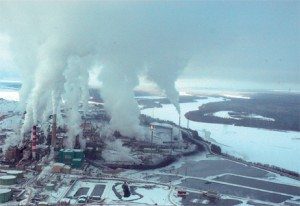In the last two years, severe extreme weather events — including drought and hurricanes — have cost the American economy $188 billion. Unfortunately, this situation will worsen if we continue to burn fossil fuels that release carbon pollution into the atmosphere. In fact, just yesterday, scientists in Hawaii found that the amount of carbon dioxide in the atmosphere jumped dramatically to a new record high in 2013. Clearly, we’re on the wrong path.
The good news, though, is that we can solve this problem and avoid the most catastrophic effects of climate change by putting less pollution in the air. That’s why more of our elected officials are getting serious about putting a price on carbon dioxide pollution.
In last month’s State of the Union address, President Obama said
“I urge this Congress to pursue a bipartisan, market-based solution to climate change, like the one John McCain and Joe Lieberman worked on together a few years ago. But if Congress won’t act soon to protect future generations, I will.”
Today, legislators from the House and Senate responded to the President’s call. Representative Henry Waxman (D-CA), Senator Sheldon Whitehouse (D-RI), Representative Earl Blumenauer (D-OR) and Senator Brian Schatz (D-HI) released a discussion draft of a bill that would charge polluters for the carbon pollution they release into the air, reducing the pollution responsible for fight climate change.
In December 2012, CAP established five principles for a progressive carbon fee. This fee should:
- Be sufficiently robust that it leads to meaningful reductions in greenhouse gas pollution, getting us on a path that helps us avoid the most catastrophic effects of climate change. In addition to being high enough to affect pollution rates, the tax should also increase over time and be applicable to non-carbon-dioxide greenhouse gases such as methane. This would both ensure a continuing reduction in the release of carbon dioxide and also encourage companies to move toward cleaner energies instead of different dirty ones.
- Encourage businesses to make new investments in energy efficiency and renewable energy to reduce greenhouse gas emissions. This will stimulate the economy and put people back to work in the burgeoning clean-tech and green-jobs sectors.
- Reduce—not increase—economic vulnerability of low-income households by ensuring that they are fairly compensated for any increase in energy prices.
- Have appropriate mechanisms to protect existing American businesses and prevent so-called pollution leakage to countries without similar systems in place. Leakage occurs if highly polluting industries simply move to other countries that don’t have a comparable limit on pollution; in this way, they can continue business as usual without stricter environmental regulations. Leakage can also happen if domestic industries shut down, causing us to import goods from other countries.
- Reduce the budget deficit to prevent draconian cuts in vital domestic programs by raising revenue from the tax.
The draft bill from Waxman, Whitehouse, Blumenauer, and Schatz meets these principles. It suggests a price of $15-30 per ton of carbon dioxide, which is sufficient to significantly reduce pollution. The bill collects the fee from midstream entities that already report greenhouse gas pollution data to the government, so it creates no large new bureaucracy. The draft also seeks comment on the best ways to spend the revenue, including consumer protection and deficit reduction.
This draft bill is part of an ongoing effort by Waxman and Whitehouse to continue to educate lawmakers and the media about the tremendous health and economic threats posed by climate change, as co-chairs of the Bicameral Task Force on Climate Change. They have solicited policy ideas from large businesses and environmental groups. They also sent a letter to the President recommending executive actions he could take to reduce carbon pollution under existing laws.
The authors of the draft bill are soliciting comments until April 12, and plan to formally introduce a new version of the bill in the coming months. With the leaders of the House majority denying the fundamental science of climate change, its prospects for passage are admittedly dim. This time, however, is Congress’s chance to act. Unless this bill or something very similar gets passed, Congress can look forward to the Environmental Protection Agency using its authority under the Clean Air Act to put limits on greenhouse gas pollution from the largest polluters.
Richard W. Caperton is Director of Clean Energy Investment at the Center for American Progress
This article was originally published on Climate Progress. Reproduced with permission










